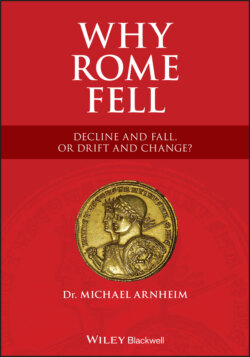Читать книгу Why Rome Fell - Michael Arnheim - Страница 10
“Indissoluble Union and Easy Obedience”
ОглавлениеHow do these two comparisons help? In his inimitable rolling prose, and without undue exaggeration, Edward Gibbon (1737–94) pointed to “the indissoluble union and easy obedience that pervaded the government of Augustus and the Antonines.” (Gibbon, Ch. 51.) Contrary to the special pleading of some modern writers, these two crucial cementing factors were absent in the later Roman Empire.
Tacitus (c.56–c.120) puts into the mouth of a Caledonian (Scottish) chieftain what has become a well-known indictment of Roman rule: “Robbery, slaughter, and plunder, they describe in lying words as empire, and where they make a desert, they call it peace” (Tac. Agric., 29 f., tr. M. Arnheim). It is, of course, more than likely, that leaders of conquered peoples would not have thanked the Romans for depriving them of their liberty, and we know of several hard-fought conquests over the years. Yet, before long, the benefits of Roman rule came to be appreciated, especially when the Romans opened up their own senate and, indeed, the imperial purple itself, to provincials. Gibbon’s point is brought home all the more forcefully when it is recognized that, whatever happened to the Roman Empire, it did not suffer the fate of the modern British, French, Portuguese, and Dutch colonial empires, which all came to an end as a result of local nationalist resistance. Roman citizenship was highly prized. Civis Romanus sum (I am a Roman citizen), famously proclaimed Paul of Tarsus in asserting his right to be tried before the emperor; and peregrini (free provincial subjects) would serve for twenty-five years in the Roman army in order to earn the coveted title of Roman citizen.
Lower down in the social scale, the Principate also epitomized social mobility. Unlike in the Greek city-states, for example, in Rome manumitted slaves or freedmen—liberti or libertini (for the distinction between them, see Mouritsen 2011, p. 65)—automatically became Roman citizens, with no bar on their owning property or amassing great wealth, or even holding responsible posts in government, as occurred particularly under Claudius. Successful freedmen were rewarded for their patriotism by being given a minor priesthood in the imperial cult as seviri Augustales, which even entitled them, like high magistrates, to be attended by a lictor. Trimalchio, the fictitious anti-hero freedman of Petronius’s Satyricon, is inordinately proud of this honor, quite likely a true reflection of real life.
Caracalla’s extension of citizenship to all free male inhabitants of the empire in 212 (though apparently done for tax reasons) is yet another illustration of Rome’s policy of inclusiveness, which had already resulted in most emperors from Trajan (r. 98–117) onward being provincials.
Universal citizenship, however, had an adverse effect on military recruitment. Without an incentive for provincials to enlist, more “barbarians” were recruited than ever before, and conscription, introduced under Diocletian, continued as long as the western empire survived.
But Caracalla’s policy of inclusiveness stopped short of inviting whole “barbarian” tribes to settle. In 213, for example, the highly Romanized Alemanni broke through the northern frontier of the Roman Empire with a view to settlement. Far from welcoming these would-be migrants, Caracalla pushed them back and strengthened the frontier against them. Why was the imperial government unable to hold back the “barbarians” who were similarly attracted to Roman civilization in the fourth and fifth centuries? And why did the West fall while the East survived?
The answer lies partly in the sheer strength of numbers involved in these later “barbarian” incursions, possibly driven by pressure on themselves by a westward push from the Huns. Deterred by Constantinople’s strong strategic position and fortifications, the “barbarians” diverted their efforts to the West.
